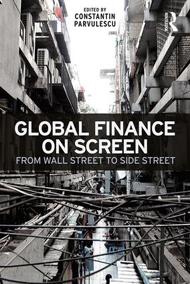An ICS book analyzes how the financial industry is represented in audiovisual media
Constantin Parvulescu coordinated the publication, which is the result of a conference organized by the Emotional Culture and Identity project in 2016

Constantin Parvulescu, a researcher with the Emotional Culture and Identity project (CEMID, for its initials in Spanish) of the Institute for Culture and Society (ICS) at the University of Navarra, coordinated the book Global Finance on Screen, which was published by the international academic publisher Routledge.
It brings together European and North American experts from areas such as audiovisual studies, anthropology, business ethics, cultural studies, political economy and sociology.
The chapters deal with topics such as film’s ability to document financial cultures,to reflect back economic, political and cultural transformations related to financialization, to pinpoint the alienating and exploitative consequences of the growing role of financial services in the global economy,to mobilize social action against the excesses of the financial world, as well as to spread financial and capitalist mythology.
They also offer in-depth research on films such as Wall Street, Margin Call, The Wolf of Wall Street and The Big Short, and on documentaries such as Inside Job, Capitalism: A Love Story, and In a Foreign Land.
The book collects texts presented in the framework of the Global Finance and the Moving Image conference, organized in 2016 by CEMID with the collaboration of the University of Navarra’s School of Communication, the Social Trends Institute and the University St. Gallen (Switzerland). It received financial support from Zurich Seguros, the La Caixa Foundation and the Caja Navarra Foundation
The meeting analyzed the representation of the financial industry in audiovisual media, addressing aspects such as the economic crisis, business ethics, the attitudes of bankers and brokers, etc. It offered an interdisciplinary reflection on the value, relevance and social impact of audiovisual materials— including documentary films, television journalism research and digital material— that explore the operations of the industry and its social and political impact.
Chapters and authorsIntroduction by Constantin Parvulescu
Section 1: Telling Finance Stories
- Graham Murdock, Screening Finance Capital: Explorations in Speculation, Crisis and Austerity
- Robert Burgoyne, Forms of Time and the Chronotope in the Wall Street Film
- Pablo Echart and Pablo Castrillo, Financial Darwinism in Recent American Feature Films
- Jens Maesse, "Financial Wisdom" as Discursive Position: How Financial Expertise Is Constructed in Documentary Film
Section 2: Critical Interventions
- Karen Ho, Finance, Crisis, and Hollywood: Critique and Recuperation of Wall Street in Films about the Great Recession
- Constantin Parvulescu, ‘Boiler Room’ and the Financialization of the American Economy
- Scott Loren, Mediating the Crisis: Revisionary Economics in Oliver Stone’s Wall Street Films
- Ignacio Ferrero, Marta Rocchi and Robert E. McNulty, No Ethics, No Heroes: How Immorality Flattens Wall Street Characters
Section 3: Screening Crisis and Recessions
- Daniel Marcus, Documentary Treatments and Cultural Hierarchies: The 2008 Financial Crash in American Documentaries
- Elena Oliete-Aldea, Global Financial Crisis in Local Filmic Scenarios: Transnational Cinema of the Great Recession
- Araceli Rodríguez Mateos, Precarity and Vulnerability: Documentaries on the Crisis in Spain
Notes from a Filmmaker
- Michael Chanan, How to Make a Film about Money and Debt without Any Money and without Falling into Debt





